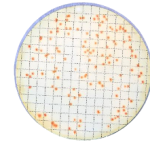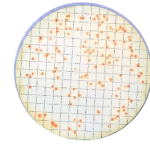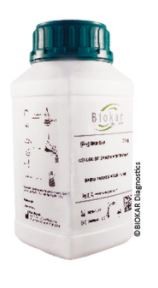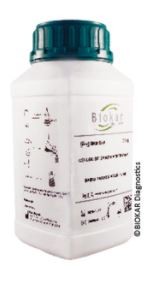Subtotal: $0.00
Nutrient Pad Sets-Tergitol-TTC-NPS **
$0.00
Nutrient Pad Sets
Type:Tergitol-TTC-NPS **
Manufacturer: Dr. Möller & Schmelz GmbH (M&S)
Item Number: 1220-H
- Description
- Size Guide
Description
Description
NUTRIENT PAD SETS –
Tergitol-TTC-NPS **
NPS for the detection and identification of E. coli and coliform bacteria
The presence of coliform bacteria and E. coli in particular is an indicator of faecal contamination.
Whereas the majority of these enterobacteria are quite harmless, some representatives of this group can cause serious health problems. The test of food and beverages for the absence of these microorganisms before their release for trade is therefore regulated in ordinances.
DESCRIPTION AND APPLICATION RANGE
ENDO-NPS are used for the detection of Esherichia coli and other coliforms from water, waste water and other samples. The formulation is modified according to ‘Standard Methods for the Examination of water and Wastewater”. Gram positive bacteria are inhibited by fuchsin and sodium sulfite, where as gram negative organisms show good growth. Bacteria that are able to metabolize lactose develop red to dark red colonies due o the presence of fuchsin. For the most of the E. coli strains, this reaction is so intense that the fuchsin is crystallized giving the typical green metallic sheen. The medium is manufactured and quality tested in compliance with DIN EN ISO 11133:2014 standard.
Profile: Dehydrated nutrient pad sets 50 mm in petri dishes, sterile
Storage: Dark and dry at room temperature
Colour: Blue
Shelf life: 2 years after sterilization
Application: For the detection of coliform bacteria in water, waste water and other samples.
Recommended Membrane Filter: White with grid, pore size 0.45 µm
Recommended Incubation Condition: 21 ± 3 hours at 37 °C
Growth: The fermentation of lactose, which all coliform bacilli are able to do, produces acid that turn the pH-indicator yellow. E. coli forms small yellowish colonies after 12 – 16 hours and later larger yellow-orange colonies with a yellow halo. Secondary lactose-negative bacteria form red colonies, some with a bluish halo. The colour depends on the respective strain. Secondary gram-positive bacteria are inhibited by bile salts.
INTRODUCTION
Nutrient pad sets (NPS) are sterile dehydrated nutrient culture media that are ready for immediate use after addition of sterile water. They are made of biologically inert cellulose cardboard that serves as a substrate for the nutrient solution. Since it does not bind the nutrients either chemically or physically, the nutrient components are completely available for the growth of microorganisms. The composition of the various nutrient solutions used for the various NPS comply with the formulations specified in the relevant standards and regulations. Nutrient pad sets have a number of advantages over conventional agar media.
- Storage at room temperature
- Shelf life up to 2 years after sterilization
- Ready for immediate use after moistening
- Easy handling
The nutrient pads are offered as a complete set in 2 different pack sizes with 50 or 100 pieces.
The packaging units contain the sterile nutrient pads in sterile Petri dishes and sterile, individually packed membrane filters, with a diameter of 50 mm. Your requirements regarding the type of membrane filter or the alternative diameter of 47 mm can be considered.
QUALITY ASSURANCE
Both the manufacturing process as well as the quality controls for the nutrient pad sets are integrated in the M&S
quality management system according to DIN EN ISO 9001:2008 and are based on GMP guidelines.
Each batch of cellulose cardboard that is used as substrate for the NPS is tested for thickness
(according to DIN EN ISO 20534), grammage (according to DIN EN ISO 536) and water absorption capacity (in-house test method).
It is also tested for growth-inhibiting substances.
The Petri dishes in which the impregnated nutrient pads are placed are manufactured under clean room conditions
and their sterility is checked regularly.
The impregnation solutions are produced using components from certified suppliers only. The weighed portions of the individual components
of the formulations are documented with their batch numbers to guarantee their traceability. The adjustment of the pH-value is also recorded.
Processing continues as soon as the solutions have been produced, i.e. the cardboard pads are then impregnated.
The drying process that follows impregnation takes place under controlled conditions.
A service provider certified in accordance with EN ISO 13485:2003 performs the sterilization of the NPS
in a validated process.
During the final inspection of the finished products, their sterility, recovery rates and if necessary
any colour reactions with positive and negative microorganisms are tested. The NPS only leave our premises if they fulfil all of the requirements.
The batch-related M&S quality certificate that accompanies every package confirms that the M&S quality standards have been checked and met.










